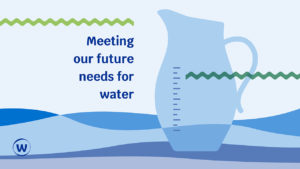Author – Paul Hickey, Managing Director RAPID
The current dry weather and hosepipe bans are focusing attention on how we create and supply resilient long term water solutions in the UK. Ofwat is working with the water sector to drive action in three areas – cutting leakage, achieving a long-term reduction in water usage and increasing available supply.
The responsibility for planning and meeting our future needs for water rests with each water company. Over recent years water companies have focused on increasing available supply by various means: cutting leakage, making operational improvements such as increasing capacity for water storage, and strengthening how they interlink their infrastructure so that they can move water around their network, allowing them to manage their supply more efficiently.
There has also been development of existing reservoirs. In 2015, Essex & Suffolk Water complete the expansion of Abberton Reservoir after almost a decade of work to store a further 15 billion litres of water to meet the need of customers and the environment. The project cost around £150m to give a total capacity of 41 billion litres, while securing the habitat for a number of important bird species and other wildlife.
With the growing pressure of climate change and the rise in population increasing the demands on water, together with the need to preserve and improve our natural environment, water companies are now working together to look at different ways that they can create resilient water solutions for the future needs of England and Wales.
For some companies reservoirs will be part of the solution and we are now seeing proposals for development of new reservoirs. The Havant Thicket reservoir is being developed by Portsmouth Water and paid for by Southern Water. After 10 years in development, the project gained planning permission in 2021. The reservoir will cost more than £120 million to complete and is due to be operational by 2029. When complete, the reservoir will hold about 8.7 billion litres of water and supply an average of 21 million litres of water each day. That’s enough water to supply about 160,000 people. The reservoir will also help protect two of our country’s rarest chalk streams – the River Test and the River Itchen.
Similarly, South East water have been funded to develop new reservoirs in Kent and Sussex. They have recently announced that they intend to publish plans for the Broad Oak reservoir in Kent for public consultation this autumn and if planning is approved, aim to have the reservoir operational by 2032. Once built this reservoir will provide at least 20 million litres of water per day, a new water treatment works and recreational facilities for the community.
While new reservoirs may be part of the answer there are a range of other options companies can consider. The goal must be to deliver the best value solutions, considering not just the financial cost but also the environmental and social consequences. Options under consideration by companies include schemes to transfer water from where there is enough, to where there is less, and recycling and reusing water.
Several water companies are also considering multi-sector reservoirs (MSRs) MSRs are collections of reservoirs and associated developments, that work together to provide multiple water benefits in addition to providing water services to water customers. The reservoirs would be designed to include the needs of other users through benefits such as flood management, irrigation, leisure facilities and improved energy use. These systems could provide these benefits at a lower cost than a single reservoir but also have the potential to deliver significant public value to wider society and the environment.
As companies develop their long-term water resource plans, we’ll continue to work with the UK and Welsh governments and other regulators to scrutinise water company proposals, and ensure that deliverable and affordable actions are in place to secure our future water supplies.
